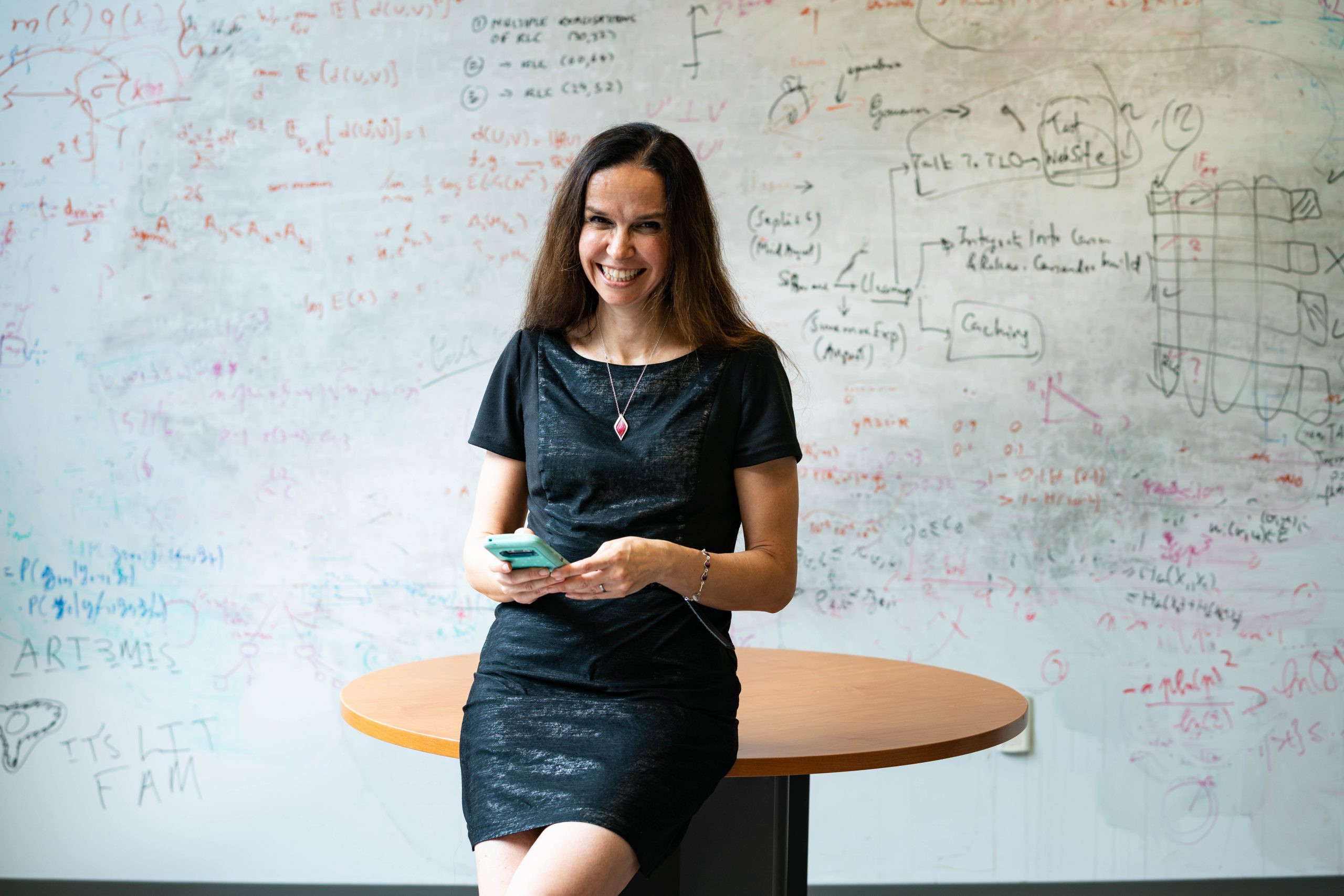Date/heure
Date(s) - 12/05/2022
10 h 30 - 12 h 30

Catégories
Le prochain séminaire du Cédric aura lieu le 12 mai 2022, à 10h, proposé par l’axe « Systèmes communicants et interactifs ». Nous aurons le plaisir d’écouter Muriel Médard, du MIT, suivi d’un exposé de Xiaotian Fu, doctorant du Cédric (équipe Laetitia).
Speaker: Muriel Médard, MIT, USA
Title : Decode any code – Guessing Random Additive Noise Decoding (GRAND)
Abstract : To maintain data integrity, systems such as 5G rely on error-correcting codes. This talk describes “Guessing Random Additive Noise Decoding” (GRAND) for universal, optimal, code-agnostic decoding co-developed with Ken Duffy, implemented with extremely low latency in silicon with Rabia Yazicigil. Without needing highly-tailored codes and bespoke decoders, GRAND can avoid the issue of fixing code choices that 5G encountered, and instead have an open platform for coding and decoding.
Bio : Muriel Médard is the Cecil H. and Ida Green Professor in the Electrical Engineering and Computer Science (EECS) Department at MIT, where she leads the Network Coding and Reliable Communications Group in the Research Laboratory for Electronics at MIT. She obtained three Bachelors degrees (EECS 1989, Mathematics 1989 and Humanities 1991), as well as her M.S. (1991) and Sc.D (1995), all from MIT. She is a Member of the US National Academy of Engineering (elected 2020), a Fellow of the US National Academy of Inventors (elected 2018), American Academy of Arts and Sciences (elected 2021), and a Fellow of the Institute of Electrical and Electronics Engineers (elected 2008). She holds Honorary Doctorates from the Technical University of Munich (2020) and from The University of Aalborg (2022).
She was co-winner of the MIT 2004 Harold E. Egerton Faculty Achievement Award and was named a Gilbreth Lecturer by the US National Academy of Engineering in 2007. She received the 2017 IEEE Communications Society Edwin Howard Armstrong Achievement Award and the 2016 IEEE Vehicular Technology James Evans Avant Garde Award. She received the 2019 Best Paper award for IEEE Transactions on Network Science and Engineering, the 2018 ACM SIGCOMM Test of Time Paper Award, the 2009 IEEE Communication Society and Information Theory Society Joint Paper Award, the 2009 William R. Bennett Prize in the Field of Communications Networking, the 2002 IEEE Leon K. Kirchmayer Prize Paper Award, as well as eight conference paper awards. Most of her prize papers are co-authored with students from her group.
She has served as technical program committee co-chair of ISIT (twice), CoNext, WiOpt, WCNC and of many workshops. She has chaired the IEEE Medals committee, and served as member and chair of many committees, including as inaugural chair of the Millie Dresselhaus Medal. She was Editor in Chief of the IEEE Journal on Selected Areas in Communications and has served as editor or guest editor of many IEEE publications, including the IEEE Transactions on Information Theory, the IEEE Journal of Lightwave Technology, and the IEEE Transactions on Information Forensics and Security. She was a member of the inaugural steering committees for the IEEE Transactions on Network Science and for the IEEE Journal on Selected Areas in Information Theory.She currently serves as the Editor-in-Chief of the IEEE Transactions on Information Theory. Muriel was elected president of the IEEE Information Theory Society in 2012, and serves on its board of governors, having previously served for eleven years.
Muriel received the inaugural 2013 MIT EECS Graduate Student Association Mentor Award, voted by the students. She set up the Women in the Information Theory Society (WithITS) and Information Theory Society Mentoring Program, for which she was recognized with the 2017 Aaron Wyner Distinguished Service Award. She served as undergraduate Faculty in Residence for seven years in two MIT dormitories (2002–2007). She was elected by the faculty and served as member and later chair of the MIT Faculty Committee on Student Life and as inaugural chair of the MIT Faculty Committee on Campus Planning. She was chair of the Institute Committee on Student Life. She was recognized as a Siemens Outstanding Mentor (2004) for her work with High School students. She serves on the Board of Trustees since 2015 of the International School of Boston, for which she is treasurer.
She has over sixty US and international patents awarded, the vast majority of which have been licensed or acquired. For technology transfer, she has co-founded CodeOn, for which she consults, and Steinwurf, for which she is Chief Scientist. Muriel has supervised over 40 master students, over 20 doctoral students and over 25 postdoctoral fellows.
Deuxième exposé: Xiaotian Fu, CNAM
Title: SGSD-SCMA: A new simplified sphere decoding-based receiver for SCMA
Abstract: Sparse code multiple access (SCMA) is one of the promising schemes to meet high connectivity and spectral efficiency in the future wireless networks. The iterative detectors, e.g., message passing algorithm (MPA), provide near optimal multiuser detection (MUD) performance but becomes infeasible with large codebook size or high overloading factor. Recently, sphere decoding (SD) has been considered in the MUD of SCMA. To overcome the constraint and further decrease the computational complexity of the SD-based detectors in the literature, we propose two pruning algorithms, PRUN1 and PRUN2, and introduce SGSD-SCMA decoder. The pruning algorithms provide a trade-off between the error probability and the computational complexity of the SGSD-SCMA. We will show that the proposed detector outperforms the iterative detectors and SD-based state-of-the-art when the overloading factor is moderate and the codebook size is large.
Bio: Xiaotian Fu received the B.Sc. degree in Automation from Southeast University, Nanjing, China, in 2017 and the M.Sc. and Ph.D. degree in Telecommunications and Networks from Conservatoire National des Arts et Métiers (CNAM), Paris, France, in 2018 and 2021. She is currently a post-doctoral researcher involved in a joint Orange labs/CEDRIC lab research project. Her major research interests lie in standardized 5G NR MIMO, wireless multiple access techniques, low-complexity detection algorithms and machine learning for future wireless networks.
